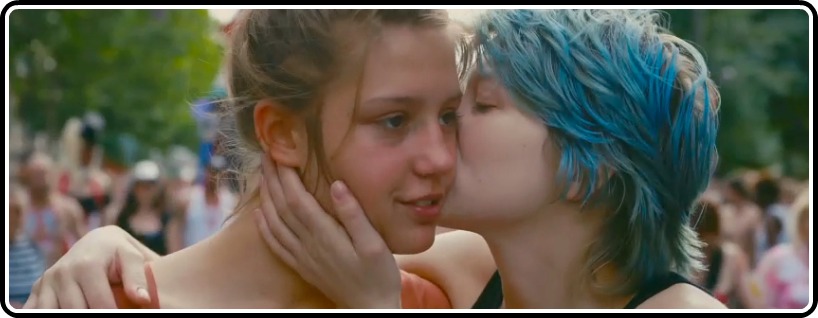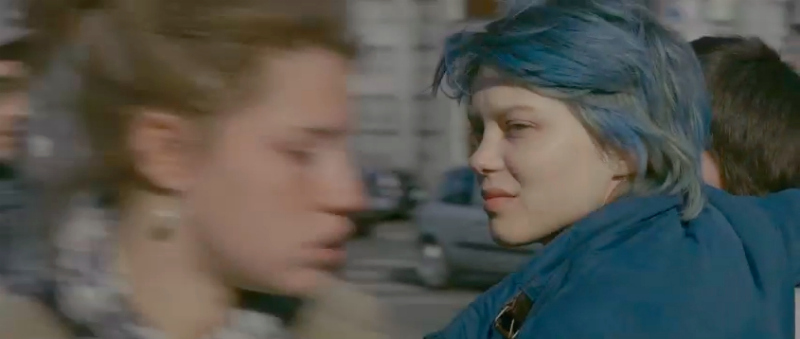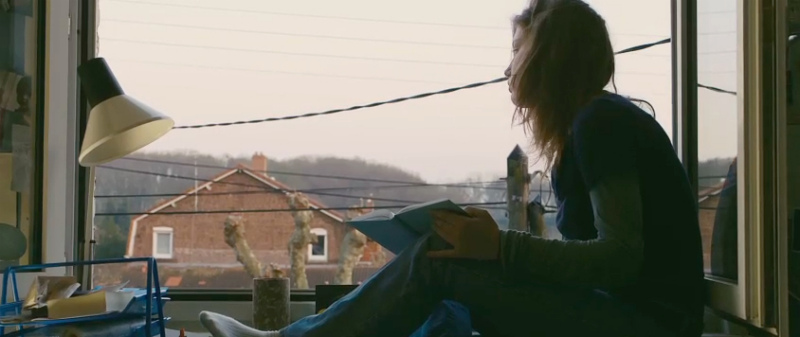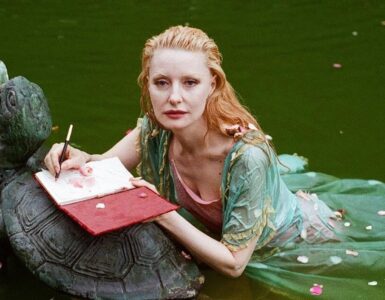
I suppose you’ll know whether this movie is for you the moment you hear “three-hour relationship drama,” so even as there’s little use in using a review to “Recommend!” a given film to you, our faithful readership, this type of exercise really lets you draw the line in the sand quite early. What is perhaps most immediately remarkable about Blue is the Warmest Color, however, purely from a craftsmanship perspective, is that the film hardly feels like three hours at all, so wrapped up was I immediately in the drama at hand. This also points to the film’s central weakness – I could have used a whole lot more. Abdellatif Kechiche (who co-wrote the adaptation of Julie Maroh’s comic book with Ghalia Lacroix) knows how to invest in little moments that mean the world, and even more so how to punctuate the gigantic ones, but his sense of narrative momentum is scattershot, letting narrative cliches and standard markers of crumbling relationships to do the work for him, rather than effectively build to grand confrontations.
Paul Thomas Anderson once said he likes to make long movies because you can spend a whole hour just getting to know your characters before you’ve even started in on the main plot; insofar as Blue is the Warmest Color could be said to have a “main plot,” Kechiche takes the same tack here. Adèle (Adèle Exarchopoulos) is going through the normal growing pains of one’s teenage years, attaching herself to various people without quite knowing exactly why, and can’t quite figure out why she’s so disinterested in a boy she’s dating. All her friends talk him up, comparing him to Brad Pitt, and despite not sharing a great many interests, he’s keen to investigate hers and seems on the whole to be quite the gentleman.
And then she sees Emma (Léa Seydoux).

At first it’s just in passing, on the street, and this is exactly the kind of moment that Kechiche renders so exquisitely – Adèle is not just intrigued, but transformed. She walks around the rest of the day, through her date, through dinner, as though in a daze. It’s the kind of lightning-bolt moment that utterly shakes you at that age, and in many ways, Adèle will chase that feeling for several years to come, fitting her life around her girlfriend instead of her girlfriend into her life. That night, while masturbating, she fantasizes about this mysterious woman.
It’s the first of many explicit depictions of lesbian sex, a creative decision that will suddenly urge critics to ask the most basic question of any artistic choice – “does he earn it?” Adèle and Emma’s relationship is defined largely by mutual attraction and passion; they don’t share many of the same interests, aside from a general appreciation of art (Emma is a painter; Adèle a bookworm and part-time writer), or life goals (Emma passionately pursues her art, while Adèle is content simply to be with her). Their almost biological desire to be with one another is what bonds them, and seeing the total expression of that is essential to understanding and emotionally engaging with their relationship. That said, Kechiche makes some odd decisions in presenting the sex scenes, never building any emotional or visceral momentum, just depicting one act after another in 30-to-60-second bursts for several minutes on end.
What feeling that does come through is purely through Exarchopoulos’s and Seydoux’s performances, perhaps as it should be. It’s all very easy to get into torrid details about writhing bodies and aching faces, but I’ll simply state that the passion is palpable, which makes the scenes far more compelling than the particulars of their physical interactions ever could. What these two sublime actresses portray is an aching that goes beyond the emotional, beyond physical attraction, into the attachment one might have to…well, really, there’s no comparison. We might fear for the loss of a limb or a vital organ, but we do very little to try and constantly please it. The more religiously-inclined might constantly yearn for God’s approval, but know that his love is unconditional. What Adèle feels for Emma is the kind of unbridled affection that comes only with a great spiritual awakening to the very idea of falling in love, the feeling that overcomes all other goals and desires, and which can become absolutely crushing the second it is called even slightly into doubt.

What Kechiche draws from this essential feeling is rapturous; there is a scene late in the film, as Adèle boldly tries to regain Emma’s affections, that is breathtaking in its conception and dedicated execution, full of heartache and yearning and lust. It is clear that Emma and Adèle complete one another, but less certain whether those same compatible ingredients are sustainable.
As fine as Seydoux is, it is Exarchopoulos who defines the emotional experience of the film, and who holds everything that is beautiful about it in her hands. There is a tendency amongst critics who fashion themselves as rather hip to dismiss performances wrought with screaming and tears, but I maintain that there are few things as immediately compelling as a performer dispensing with every emotional reservoir that simple decency demands we construct. Her work taps into the absolute id of young adult passions, wherein the slightest infraction or mistaken glance is a crushing blow, when the simple tragedies of everyday existence have not yet been diminished or tempered. Exarchopoulos has freed herself from all vanity, getting into the part of a long night’s cry when any concern for personal appearance has long since passed. Her hair forever a tangled mess atop her head, her beauty comes through not as a managed construction, but through absolute naturalism.
It is a shame, then, that Kechiche has not afforded her and Seydoux a more compelling structure for their affair, touching on the most banal and normative explorations of a relationship’s rise and fall. What he does in the middle, especially as Adèle struggles with the extent to which she’s comfortable with anyone knowing her sexual identity, is often extremely touching, which makes the rather familiar downturn all the most dispiriting. It’s not that cliches are necessarily unwise choices, just that they must be more fully invested, and – strange as this may be to say of a three-hour film – more fully explored. As much as Exarchopoulos makes her character’s behavior genuine and thoughtful, I simply didn’t believe some of the most seemingly understandable decisions Adèle makes. It was as though Kechiche took our familiarity with such tropes for granted, and felt no need to invest them with any particulars. The emotional urgency carries him far, but a little backbone would’ve made this transcendent.





![Bergman Island (The Criterion Collection) [Blu-ray]](https://criterioncast.com/wp-content/uploads/2022/11/bergman-island-the-criterion-collection-blu-ray-400x496.jpg)
![This Is Not a Burial, It’s a Resurrection (The Criterion Collection) [Blu-ray]](https://criterioncast.com/wp-content/uploads/2022/11/this-is-not-a-burial-its-a-resurrection-the-criterion-collection-blu-ray-400x496.jpg)
![Lars von Trier's Europe Trilogy (The Criterion Collection) [The Element of Crime/Epidemic/Europa] [Blu-ray]](https://criterioncast.com/wp-content/uploads/2022/11/lars-von-triers-europe-trilogy-the-criterion-collection-the-element-of-400x496.jpg)
![Imitation of Life (The Criterion Collection) [Blu-ray]](https://criterioncast.com/wp-content/uploads/2022/11/imitation-of-life-the-criterion-collection-blu-ray-400x496.jpg)
![The Adventures of Baron Munchausen (The Criterion Collection) [4K UHD]](https://criterioncast.com/wp-content/uploads/2022/11/the-adventures-of-baron-munchausen-the-criterion-collection-4k-uhd-400x496.jpg)
![Cooley High [Criterion Collection] [Blu-ray] [1975]](https://criterioncast.com/wp-content/uploads/2022/11/cooley-high-criterion-collection-blu-ray-1975-400x496.jpg)